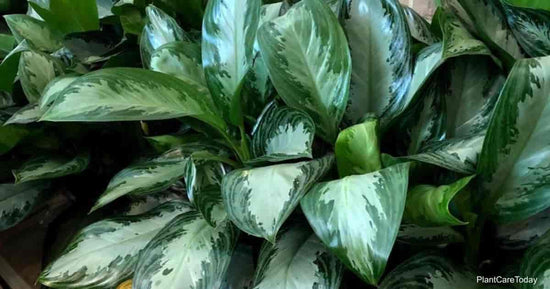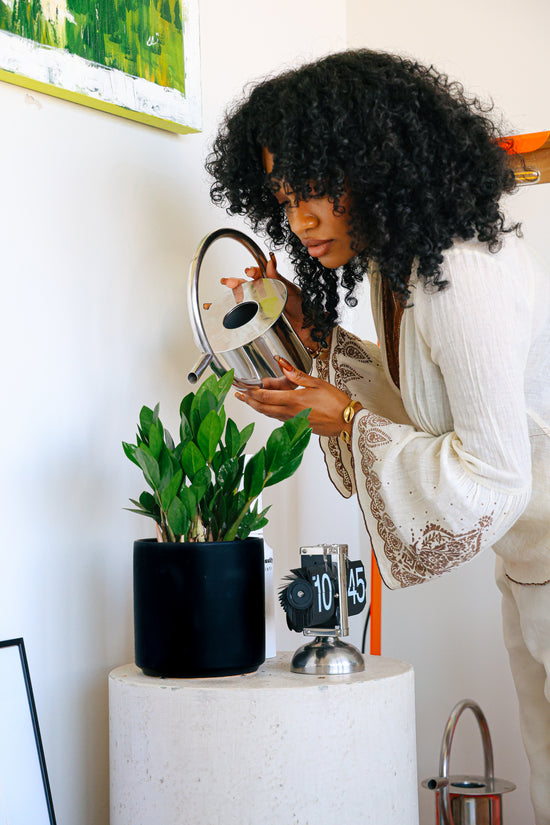We’re so fortunate to be able to bring nature into our homes and live amongst these fascinating organisms. Providing air-purifying effects and cognitive benefits, plants also inspire and stimulate us mentally. They’re a life force that can greatly impact how we see and navigate our own lives. There are plenty of lessons they can teach us and we’ve voted on our top 5 lessons below:
PATIENCE WITH OURSELVES
As we quickly learn, plant care is not always instantly gratifying. We are often dedicating great time and efforts to a fragile being that may not show evidence of our care for days, weeks, or months, in some cases. The frustrations of trial and error while learning individual plants can also convince us we’ll never have a “green thumb”.
This regular process of training ourselves to persist in a sustainable goal also teaches us patience in our own self-care. Sometimes we take steps that feel difficult or a nuisance because we can trust they will do us good in the long run. Like our plants, we also know that when we let care take a backseat to other responsibilities, we pay for it in stress, our mood, fatigue, or physical ailments. Through this lesson, we can trust that we’ve laid reliable foundations for ourselves to handle all of life’s seasons.
GROWTH THROUGH TRIALS
Plants have the amazing ability to bounce back after various mistakes and extreme neglect. We might think all hope is lost, yet with time and extra care, they reveal their resilience to unfavorable conditions. Some plants even produce blooms only under extreme stress - nature’s testament to how perseverance can manifest something worthwhile and beautiful. We can keep this in mind in our own lives, remembering that challenging moments are temporary and bring growth + new perspective.
PROACTIVE CARE OVER REACTIVE CARE
Anyone who has ever been frequently forgetful or eager to water can relate to the struggles of nursing a plant back to health. Other hiccups in care can cause damage or suffering to plants as well, such as pests or fungus. Proactive care is the best way to maintain health, preventing stress and infestation. The same goes for our own wellness. It takes more time and energy to bounce back when the care is in response to already being under stress, burnout, or illness. This lesson is a reminder to prioritize ourselves, even when it’s difficult, inconveniences others, or requires time in our routine. We can do this by dedicating time to check in with ourselves, what we need, and setting boundaries that allow space and time to recharge.
LET GO TO MAKE SPACE
Pruning old or dead pieces of a plant redirects energy to healthy greenery and new growth. Likewise, carefully repotting them into larger plants allows their full root system to breathe and expand. Both of these acts require considerate timing, as well as intuitive and informed decision-making. Recognizing when to let go of what no longer serves the plant will make space for fresh, new growth. This is a lifelong reminder to ourselves that getting to new places and opportunities may require a release, sacrifice, or new step on our part. We’ll come across situations and relationships that we’ve outgrown and may hold us back from a higher quality life.
Pruning is best done at the start of spring and fall, as well as anytime there is damage, disease, or new growth coming in. Young plants can be repotted annually or biannually, while mature plants can often go 2-3 years or more before needing a larger planter size. It’s best to increase the planter size by only 2 inches at a time so the root system can properly adapt to the new change.
WE EARN OUR GROWTH
Many plants will survive and even produce new growth under surprising conditions of neglect, drought, and low light. However, when deprived of their specific needs, growth can become stagnant and appearance lackluster. In survival mode, the few resources available are insufficient and the plant will likely become inactive as it reserves energy. Some plants may even undergo drastic and irreversible cosmetic changes.
Just like plants, when humans have their basic needs met, we’re better able to function and lead a more fulfilling life. We can plan, create, socialize and take responsibility for our own growth and advancement. Similarly, when plants are intentionally tended to, they’re cultivated in a nurturing environment, fueled by adequate resources, and full of robust life. Through regular care, seasonal fertilizing, pruning, and unique attention, plants regularly reward us with flourishing growth.
“NATURE DOES NOT HURRY, YET EVERYTHING IS ACCOMPLISHED” - LAO TZU
—----
Thank you for reading! Share your plant lessons with us @groun.ded.







